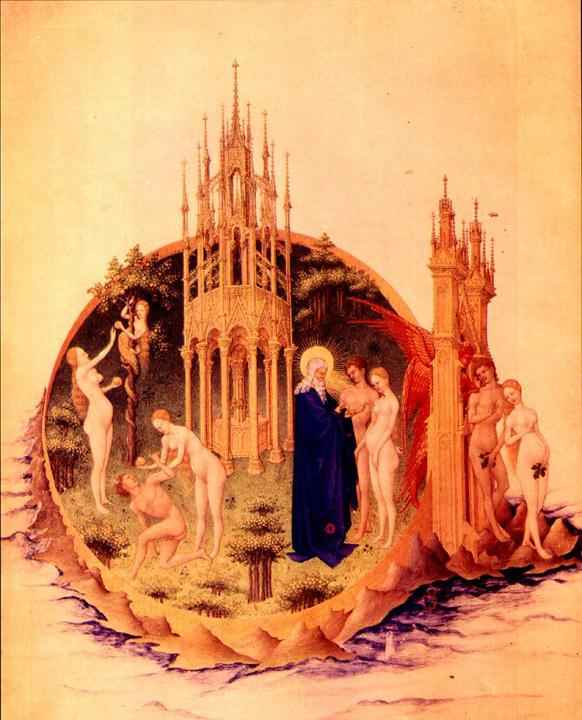
Temptation, Fall, and Expulsion
from Les Tres Riches Heures du Duc de Berry,
1411-1416.
When Life Flows Fresh and Free

Temptation, Fall, and Expulsion
from Les Tres Riches Heures du Duc de Berry,
1411-1416.
When Life Flows Fresh and Free
I understand, but have never empathized with those who express a desire to go back and relive an earlier time in their lives. The future has been a far more powerful force, pulling me along with nary a backward glance. Even so, I believe we all, at times, engage in thinking about 'what might have been' and succumb to yearning for simpler, less troublesome days.
Such unambiguous and uncluttered times are the result of skewed memories. In memory, we become oblivious to the anomalies and the pervasive grayness that saps moral certitude. In memory, we can leapfrog back to a time in which we forget we sacrificed 'the best' for 'the good' and brushed aside competing wills for harmonious personal relationships. In memory, we are clearly the misunderstood ones in disputes and the heroes in conflict.
Given the ambiguities and difficulties that engulf our lives, a bit of nostalgia for some Edenic past seems quite sensible. As a passing fancy, yes; as an escape, no.
The ancients left us a vivid warning sign in the old biblical myth of the Garden of Eden. The story, rooted in the beginning of human history, tells of Adam and Eve living seemingly untroubled and uncomplicated lives, unaware of the knowledge of good and of evil. Once they ate from that tree, they were no longer innocent and had to be expelled. We read that God placed at the gate an angel with a flaming sword, barring a return to the place of innocence. I believe the ancients, with deep insight, understood that if a person leaves the present and seeks to reenter the past, he or she is in immanent personal danger.
This came to mind as I read a recent article in which the author traced the spiritual life from innocence to loss of innocence to regained innocence. I understand the intent of the writer, but the idea of 'innocence' as something to which we humans can return is deceptive. In fact, it is dangerous, in that it is an ideal against which everyone will fail. Maturity on the spiritual journey is when a person can pick up the pieces of her or his life--the good and the bad, the serious and the trivial, the heroic and the cowardly, the constructive and the destructive, the helpful and the damning--honestly own it all, embrace its fullness, and move forward with integrity and clarity.
The best shorthand expression I have found of this truth (author unknown) is this: "I wouldn't give a fig for simplicity on this side of complexity, but I would give all I have for simplicity on the other side of complexity." Yes.
A group of sexually active adolescent girls decided to change their behavior. They called themselves "Reborn Virgins." That label does not and cannot undo their past. However, that self-chosen label can strengthen present resolve and allow them to live life forward, not with innocence, but with clarity, and even simplicity. It is possible that they will find their lives flowing, in the words of the hymn, "fresh and free."
That is a possibility for all of us.